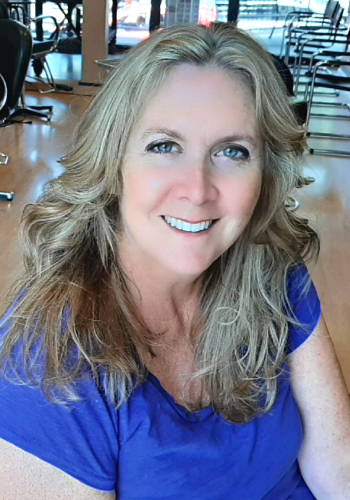A newly diagnosed woman reflects on in-the-moment advocacy, teachable moments and the power of setting boundaries with ourselves and others.
I am wearing the ALS t-shirts now. I’ve decided that this is the best visual cue to people around me that I’m not recovering from surgery, I’m not drunk, and you really should be nice to me because I’m dying.
Of course the t-shirt implies I’m open for conversation, and that’s not always true. Conversation takes energy and I must ration that. Sometimes no one asks, and I wish they would. The ALS t-shirt is my in the moment advocacy, not just a staring antidote. Living with ALS puts you in an advocate role whether you want to be or not. By virtue of living with this disease, each day you wake up, your mere presence is making a statement. This is what this disease looks like.
Making statements, and being stared at, was something I got used to in my career. Maybe that’s why I’m more sensitive to this process, and how it’s changed for me. For 30 years I’ve been a head of human resources/professor/consultant and coach, specializing in adult development, managing life transitions, diversity and emotional intelligence. Just the type of topics and knowledge base that is coming in handy now. Heal thyself right? Of course we all know it is different when the doctor becomes the patient.
I’m struggling with having to give up my career; I’m too tired to do any of those things now. But I still have the knowledge base, and have chosen to still be a teacher. The t-shirt is advocacy, and my physical and emotional presence is a lesson. If people choose to ask, they can learn more about not only ALS, but compassion, empathy, patience. When I talk about this disease, the death of a thousand cuts in losing mobility, in battling fatigue, in recovering from a fall, I try to do this without self-pity or anger. Sometimes it’s hard - when a place I managed to get to has no disability access, though they said they did, or one of my medications was denied by insurance, or someone was staring at me. Some days it’s harder than others. When it’s hard, I try to stop and remember I speak for all of us, as do you. I’m grateful that Pete Frates spoke for ALS, and now we don’t have to explain it to people when we tell them what we have. Most of them know what it is now, so they can grimace and apologize without needing a tutorial.
Our presence is showing others that ALS, while a fatal disease, does not determine everything we are. We are still people, with hopes and dreams. We can still experience joy in activities we love, and around loved ones. We may feel defeated, and afraid of the coming progression, but by being honest about that we show everyone that we’re no different than they are. They are surely struggling with something-everyone is- but still have hopes and dreams they invest time and energy into. They make plans, and so can we. And all of us need to live in the present. Right now, they aren’t someone with a disability. Someday they may be.
So how do you “speak your truth” as the phrase goes? It takes courage. It can be tempting when you live with ALS to hide out. When we go out though, or show up on a Zoom call, when we are honest about what is so clearly a herculean struggle, it helps others. To feel compassion, to build that empathy muscle, and maybe even just to say “there but for the grace of god go I”. It’s also inspiring, like wow, if this person can get up every day with ALS and do that, what is stopping me? We have knowledge to share. Some practitioners I’ve engaged with –my estate lawyer, financial advisor, various OTs, PTs, massage therapists- have said to me that they “don’t know much about ALS.” I can’t help but be a teacher and say “well, now is a great opportunity for you to learn. You can expand your practice base!” Lucky them! They might not be feeling lucky, but rather squeamish, but the next person they help with ALS is going to benefit from this experience.
How we can also benefit ourselves and others is by learning to set boundaries with people. It starts with us, always. If someone in your circle isn’t helpful with their words or behavior, kindly find the way to set limits that help them. No one is a mind reader. I have many well-meaning friends who want to know how my treatment is going, what clinical trials may be open, how I’m feeling with meds, etc. I appreciate their interest, and understand why they want to know when they visit me, or come to help out in my house. I know too though that I rarely get a break from thinking about ALS, so once I give them a brief update, I want to move on to other topics. I want to talk about the stuff we used to share, like going out for live music, our rowing club, gardening. Sometimes I have to be really clear about it when a quick “well, enough about that, how are YOU?” isn’t working. Yet, if I don’t do that, I risk getting frustrated and impatient, and maybe even not wanting to see that person, and that isn’t good for either one of us. ALS isolates us enough.
So I make sure I stop and redirect, firmly if necessary, before I get frustrated.
Another area I’ve found in which I’ve needed to set boundaries, on myself and others, is how people process anxiety. It transfers. I know my illness is happening to my family and friends as well as to me. When they worry and are anxious, they often process it by questioning my decisions. What I should be eating, whether I should be driving, going on the trips I have planned, still trying to occasionally swim and kayak…. I get that there is concern, but don’t they know I’ve wondered those things myself and still decided that for today, the answer is yes? It may be different tomorrow.
Sometimes when people question me I have to bite my tongue to not ask “What would you do if this happened to you? Wouldn’t you still want to do the things you love?”
I’m experiencing a lot of advice giving too, particularly the phrase “You know what you should do?” No, I don’t and please don’t tell me! I know people are well meaning. I’ve given advice for a living. I meant well, and it’s great to feel helpful. Of service. Yet, I always tried, I’m sure unsuccessfully, to not give advice unless asked (or paid ?) Because when we do, it can’t help but imply that the person doesn’t know what to do themselves. So this is another area where we need to set boundaries with the people we love and who love us. It can be with a simple phrase that acknowledges what is happening for them, for again, our disease is happening to them too. Here are some examples:
“I know you are worried about my (insert), and I so appreciate how much you care about me. However, I think I’ve looked at all the aspects of it and am making the right decision for now. That may change of course. But I hope you’ll support me with this.”
“We’ve discussed this issue several times, and I know you are just expressing your fears, but it often sounds defeating for me, so I ask that we please focus on the positive. I really need that most right now.”
I know this style of communicating can seem direct if you aren’t used to it. Boundary setting works though, as it is healthy and kind, and preserves your relationships, so important at a time when you are surely feeling less patient because you don’t feel well. Direct dialogues also achieve that other goal, of showing others that while living with a fatal illness, we are still people making plans, just like them. It opens up a dialogue up too for the harder topics to come. Our end of life wishes. While this is a topic for another time, I’ll say to you that personally I don’t know how long I want to tough this out. I’ve been honest with my family about this and they have been supportive and understanding. Thus far this hasn’t been a battle I’ve had to fight. I know many people with ALS do. But it is our life. We don’t choose to be born, but now we are making choices about when we die. Opening up that dialogue and setting boundaries with the people in our lives is important. It helps us and it helps them. By openly sharing what we need from people, and what they can expect from us, we nurture our relationships with others at a time when all energy is precious. Let’s be advocates and teachers, to strangers and loved ones alike.
- Dr. Heidi Tarr Henson

Heidi Tarr Henson has served as a vice president of human resources at several institutions, as well as an MEd/MBA professor teaching graduate courses in human resources, organizational behavior and business communication. She also owns a coaching and consulting business.
Dr. Henson holds a BA from Boston College, an MA from Harvard and a doctorate in leadership and adult development from Drake. Her doctoral dissertation addresses how diversity training can create attitudinal change, and this research was published as an ASTD case study. Some of her consulting clients have included Principal Financial Group, Ford Motor Co., Iowa Health Systems, Cell Signaling Technology and Northeast Health Systems. She also published a life transitions guide in 2011.
Heidi was diagnosed in May 2021. A native of Cape Ann, Massachusetts, she struggles with giving up her long-term passions of ocean rowing and dancing to live music, and has been re-discovering old ones like writing and watercolor painting. She can be reached at heidichannel@comcast.net.


Comments
What an incredibly thoughtful and well written blog Heidi! I’m so glad that our paths have crossed and that we can walk(roll) along on this ALS journey stronger together. Thank you!
What an incredibly thoughtful and well written blog Heidi! I’m so glad that our paths have crossed and that we can walk(roll) along on this ALS journey stronger together. Thank you for your advocacy, your teaching, and most of all your friendship!
Join the conversation. Please comment below.